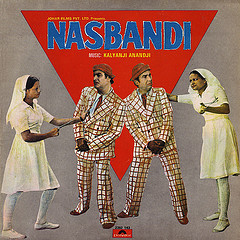Nasbandi
Nasbandi is a term used in the context of family planning and population control measures, specifically referring to the process of vasectomy, a surgical procedure used as a method of male contraception. This procedure involves the cutting and sealing of a small part of the vas deferens, which are the tubes that carry sperm from the testicles to the urethra. The goal of Nasbandi is to prevent the sperm from entering the ejaculate, thereby preventing pregnancy.
Overview[edit | edit source]
Nasbandi or vasectomy is considered a permanent method of contraception. It is a quick procedure, usually performed under local anesthesia, and it has a very high success rate in preventing pregnancy. Despite its effectiveness, the decision to undergo Nasbandi should be considered carefully, as reversal is possible but involves more complicated surgery and is not always successful.
Procedure[edit | edit source]
During the procedure, a doctor makes a small incision or puncture in the upper part of the scrotum to access the vas deferens. The vas deferens is then cut, and a small section may be removed before the ends are sealed, tied, or otherwise closed. The incisions are then stitched up. The entire process typically takes less than 30 minutes.
Advantages and Disadvantages[edit | edit source]
The main advantage of Nasbandi is its permanence and reliability as a contraception method. It does not require ongoing attention like daily pills or periodic injections and has no significant long-term side effects. However, it does not protect against sexually transmitted infections (STIs).
One of the disadvantages is that it does not take effect immediately. Men need to undergo semen tests post-surgery to ensure that no sperm are present in the ejaculate, which can take several months. Another consideration is the permanence; while vasectomy reversal is possible, it is expensive and not guaranteed to be successful.
Cultural and Social Aspects[edit | edit source]
The acceptance and prevalence of Nasbandi vary widely across different cultures and societies. In some places, it is widely accepted and promoted as part of family planning programs. In others, there may be cultural or religious objections to any form of contraception, including vasectomy. The decision to undergo Nasbandi can also be influenced by societal norms and values regarding masculinity, fertility, and family planning.
Conclusion[edit | edit source]
Nasbandi or vasectomy is a highly effective and permanent method of contraception for men who are certain they do not want more children. It is a personal decision that should be made after careful consideration and discussion with a healthcare provider.
Navigation: Wellness - Encyclopedia - Health topics - Disease Index - Drugs - World Directory - Gray's Anatomy - Keto diet - Recipes
Search WikiMD
Ad.Tired of being Overweight? Try W8MD's physician weight loss program.
Semaglutide (Ozempic / Wegovy and Tirzepatide (Mounjaro / Zepbound) available.
Advertise on WikiMD
WikiMD is not a substitute for professional medical advice. See full disclaimer.
Credits:Most images are courtesy of Wikimedia commons, and templates Wikipedia, licensed under CC BY SA or similar.Contributors: Prab R. Tumpati, MD

